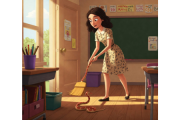We lived in six houses in the eight years we enjoyed family life together in Venezuela, several months of which were spent in a bungalow in steamy Maracaibo on the coast, not far from Lago de Maracaibo, the biggest lake in South America, on which squatted countless oil derricks, all owned by foreign oil companies like Mobil, Shell, Creole, and numerous others. Foreigners were not permitted to own houses, so all of these temporary homes, allocated by Shell to its employees, were rented, and we moved frequently. One or two of the houses were unsuitable, but Quinta Tecka in Caracas was by far the best of all. “Quinta,” a synonym for ‘casa,’ is Spanish for a single, often substantial, dwelling, like a country house or even a farm. At the time, life for us there was paradise, a blessed release for my parents from the post-war austerity of years of rationing, and the scrimping and saving that Britons then had to endure. Dad and Mum learned Spanish from Berlitz, immersing themselves joyously in the social and cultural life of the capital, entranced by the compulsive rhythms and seductive melodies of Latin American music, dancing the joropo, singing Alma Llanera (‘Soul of the Plains’) with us and playing it on the piano. They acquired recordings of lively folk music, and entertained friends and Venezuelan colleagues and their wives, nearly all of whom, like Mum, were homemakers, as a father’s middle-class salary was then sufficient to support his entire family. I remember my younger brother, then four or five, eating olives and cigarette ends left over from one such evening, and my mother’s annoyance when she discovered a toilet seat had been broken by a British naval officer the night before. My parents read The Caracas Journal, the chatty American-owned local paper for English speakers, and flights between Miami and Maiquetia Airport on the Caribbean coast were frequent. We swam at the pool or played sports at the Caracas Sports Club, which offered a rich social life for its primarily English-speaking members, at least once a week.
I was three years old when we first arrived in Caracas, and for years had no idea civil unrest lay boiling just below the sunny surface of everyday life. Like the earthquakes that devastated the city in 1755, 1812, and again in 1967, the Revolution of 1958 was to bring about dramatic change that would eventually end the life of easeful exile enjoyed by expatriates, and hasten their exit from the country. We left in 1961, when I was 11, and my younger brothers 8 and 5. I made a return visit with my wife Sheila in 1980, but despite my being able to locate every one of those houses, it was no longer the same place. It was more down-at-heel, with crime on the rise, neglected parks, littered plazas, other facilities vandalized, and the makeshift shacks of the campesinos, migrant poor from the countryside, had mushroomed on the hillsides and in the quebradas, shallow valleys of unusable land, emblematic of misery born of frustrated hopes. From them, their ragged inhabitants could see streets apparently paved with gold, but soon realized these were not for them. It was in this poor underclass that support for socialism grew by leaps and bounds, and ‘progressive’ politicians were quick to harness their discontent. The inevitable nationalization of the oil industry into an unwieldy monopolistic conglomerate called ‘PetroVen’ by the government, along with rampant corruption and economic mismanagement had by 1980 each begun to play a part in souring the capitalist world’s interest in the country. Soon thereafter, the populist kleptocratic socialist Chavez, his successor Maduro and their cronies bankrupted the nation, relegating it, like Russia today under Putin, and Zimbabwe yesterday under Mugabe, to the status of pariah state among the nations of the world, with disastrous consequences for the Venezuelan people : violent crime, social collapse, uncontrollable inflation, and mass emigration. But this discord lay all in the distant future.




